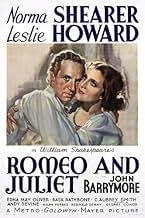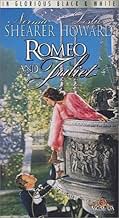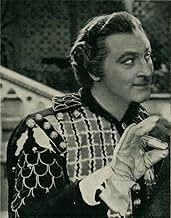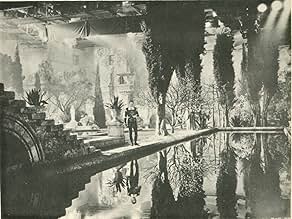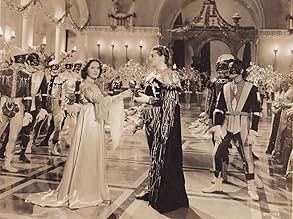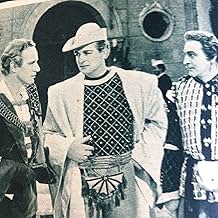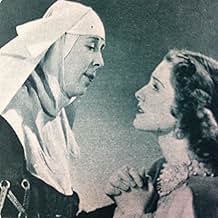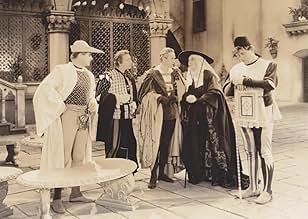VALUTAZIONE IMDb
6,5/10
2364
LA TUA VALUTAZIONE
Aggiungi una trama nella tua linguaYoung love is poisoned by a generations long feud between two noble families.Young love is poisoned by a generations long feud between two noble families.Young love is poisoned by a generations long feud between two noble families.
- Regia
- Sceneggiatura
- Star
- Candidato a 4 Oscar
- 4 vittorie e 5 candidature totali
Charles Bancroft
- Nobleman
- (non citato nei titoli originali)
Dean Benton
- Minor Secondary Role
- (non citato nei titoli originali)
Carlyle Blackwell Jr.
- Tybalt's Page
- (non citato nei titoli originali)
John Bryan
- Friar John
- (non citato nei titoli originali)
Recensioni in evidenza
ROMEO AND JULIET, the scions of old Verona's two most powerful families, become the playthings of fate & the fools of fortune.
This was a Very Big Film for MGM in 1936. No (reasonable) expenses spared. Not only was the Studio tackling The Bard for the first time in a major way, but the extreme celebrity of the original play guaranteed a great deal of public attention. Several choice roles were available for MGM's brightest stars and the part of Juliet would be the desire of every young actress on the lot.
Almost predictably the role went to Norma Shearer, who, as Irving Thalberg's wife, could almost pick & choose what she (or Irving) wanted. However, it should be stated at once that she is splendid in the role. Sweetly demure, innocent, apprehensive, fiercely protective of her love & recklessly heedless of her fate - she is Shakespeare's heroine.
She is matched by Leslie Howard's Romeo. A bit giddy at first with puppy love, he quickly matures into a tender lover & vengeful killer, finally willing, like Shearer, to forego all of his Catholic teaching and commit self-murder, thus dooming himself to Perdition.
Although decades too old for their roles (Juliet was 12, Miss Shearer 34; Romeo about 16, Mr. Howard was 43) they understand and speak their lines much more beautifully & proficiently than any teenager. Shakespeare's lines are really verse of a high order and demands skill & maturity. Howard & Shearer certainly have no problem there. Nor were they the only members of the cast whose ages were rather past the prime.
In his only feature length Shakespearean film, John Barrymore amply displays his celebrated talent in a bravura performance as an aging, sottish Mercutio. Barrymore understood the character thoroughly and he turns this strange, brilliant man into one of the film's chief treasures. Interestingly, much of his dialogue is rather scatological & gross, but being Shakespeare it seems to have flown under the radar of the Hays Office.
Edna May Oliver steals nearly every scene she's in as Juliet's waspish, eccentric Nurse. Basil Rathbone makes a fiery, insolent Tybalt. Reginald Denny adds a touch of distinction in the throwaway role of Benvolio, while wonderful old Sir C. Aubrey Smith & Violet Kemble Cooper are colorful as Juliet's parents.
At first blush, Andy Devine seems an odd choice for a Shakespearean production, but he is very competent as the Nurse's simpleminded servant.
Somewhat lost in this excellent cast is English actor Ralph Forbes in the rather thankless role of the County Paris. His is a somewhat sad story. Although replete with talent & charm, he still never quite reached the top echelons of stardom. He would have made a great Romeo.
Movie mavens will spot Katherine DeMille as the fair Rosaline (her cousin Agnes de Mille was the film's choreographer) and Ian Wolfe as the impoverished apothecary, both uncredited.
The film has wonderful production values - the sets, costumes and background score (borrowing themes from Tchaikovsky) all of the highest quality. For a small chuckle, watch closely during Juliet's dance at the Capulet ball - one of the dancers behind her steps on her dress hem and nearly trips. It's very fast, but worth catching.
This was a Very Big Film for MGM in 1936. No (reasonable) expenses spared. Not only was the Studio tackling The Bard for the first time in a major way, but the extreme celebrity of the original play guaranteed a great deal of public attention. Several choice roles were available for MGM's brightest stars and the part of Juliet would be the desire of every young actress on the lot.
Almost predictably the role went to Norma Shearer, who, as Irving Thalberg's wife, could almost pick & choose what she (or Irving) wanted. However, it should be stated at once that she is splendid in the role. Sweetly demure, innocent, apprehensive, fiercely protective of her love & recklessly heedless of her fate - she is Shakespeare's heroine.
She is matched by Leslie Howard's Romeo. A bit giddy at first with puppy love, he quickly matures into a tender lover & vengeful killer, finally willing, like Shearer, to forego all of his Catholic teaching and commit self-murder, thus dooming himself to Perdition.
Although decades too old for their roles (Juliet was 12, Miss Shearer 34; Romeo about 16, Mr. Howard was 43) they understand and speak their lines much more beautifully & proficiently than any teenager. Shakespeare's lines are really verse of a high order and demands skill & maturity. Howard & Shearer certainly have no problem there. Nor were they the only members of the cast whose ages were rather past the prime.
In his only feature length Shakespearean film, John Barrymore amply displays his celebrated talent in a bravura performance as an aging, sottish Mercutio. Barrymore understood the character thoroughly and he turns this strange, brilliant man into one of the film's chief treasures. Interestingly, much of his dialogue is rather scatological & gross, but being Shakespeare it seems to have flown under the radar of the Hays Office.
Edna May Oliver steals nearly every scene she's in as Juliet's waspish, eccentric Nurse. Basil Rathbone makes a fiery, insolent Tybalt. Reginald Denny adds a touch of distinction in the throwaway role of Benvolio, while wonderful old Sir C. Aubrey Smith & Violet Kemble Cooper are colorful as Juliet's parents.
At first blush, Andy Devine seems an odd choice for a Shakespearean production, but he is very competent as the Nurse's simpleminded servant.
Somewhat lost in this excellent cast is English actor Ralph Forbes in the rather thankless role of the County Paris. His is a somewhat sad story. Although replete with talent & charm, he still never quite reached the top echelons of stardom. He would have made a great Romeo.
Movie mavens will spot Katherine DeMille as the fair Rosaline (her cousin Agnes de Mille was the film's choreographer) and Ian Wolfe as the impoverished apothecary, both uncredited.
The film has wonderful production values - the sets, costumes and background score (borrowing themes from Tchaikovsky) all of the highest quality. For a small chuckle, watch closely during Juliet's dance at the Capulet ball - one of the dancers behind her steps on her dress hem and nearly trips. It's very fast, but worth catching.
The lavish treatment given to this by MGM and Irving Thalberg (his final production showcasing his wife Norma Shearer as Juliet) does work, as do the mature lovers and their supporting cast (Leslie Howard fitting the part of Romeo perfectly, John Barrymore and Basil Rathbone out-swashing each other as Mercutio and Tybalt), Edna May Oliver as the Nurse, typically loud, and Ralph Forbes as a bizarre Paris (no, I can't see why Juliet would want to marry him either, despite her parents' wishes). The music is lovely, despite being stolen from more classical stuff, the settings are perfectly in tune, the verse is spoken with some feeling and inspiration. Why this version doesn't get seen more often I don't know (not even on video in the UK).
Despite the fact we have a 47 year old Romeo, a 36 year old Juliet, and a 54 year old Mercutio; George Cukor's production for MGM of Romeo and Juliet manages to entertain and well.
Of course these protagonists are all teenagers, but these players have all played romantic parts in an age when romance was not something to be cynical about and they do fit their roles well. No Romeo was ever more dashing than Leslie Howard or a Juliet as passionate as Norma Shearer.
John Barrymore as Mercutio is a bit of an exception. I look at him and I think of another Shakespearean character who simply doesn't want to grow up and spends his time with the young blades of his day at the tavern. That would be Falstaff in Henry IV in both parts and if you think of Barrymore's Mercutio in that way, his interpretation makes a lot of sense.
My favorite in this film has always been Tybalt and Basil Rathbone plays him with fire and passion. Rathbone got an Academy Award nomination, the first of two, for Best Supporting Actor in the first year Supporting Actor Awards were given out. He lost however to Walter Brennan in Come and Get It. He's just spoiling for a fight with some Montagues and in the end he unfortunately gets one.
Romeo and Juliet is insightful into the Italy of the times. Italy was a geographical expression not a nation. In fact it was ruled mostly by the German entity, the Holy Roman Empire. But inside the empire and out it was a succession of petty states, constantly at war with each other. Sometimes the causes of the wars were long forgotten, but the hostilities took on a life of their own.
Right down to a couple of wealthy families in the small town of Verona where the prince there has his hands full trying to keep the Montague and Capulet feud from spilling over into violence every time some of them meet in his town.
With this background a young prince of Montague just getting over another bad romance and a princess of Capulet whose father has her slated to marry another meet and fall in love. Even when they find out their respective pedigrees, it makes no difference.
In fact the idea that love can bridge all barriers is what I believe makes Romeo and Juliet as popular as it is. It's a lesson people and nations could learn.
Norma Shearer got an Oscar nomination for playing Juliet, but lost to Luise Rainer in The Great Ziegfeld as Best Actress. George Cukor and the film itself also were up, but lost for best director and best picture.
Andy Devine plays the small part of Peter, a Capulet servant and I'm sure you're wondering what Andy Devine was doing in Shakespeare. So did he when he was cast in the part. The story goes that he went to George Cukor and told him he hadn't foggiest idea what he was doing in a classic Shakespeare play, he'd never done anything like this. Cukor supposedly told him, that was to his credit and that he would be the only member of the cast who would not be telling him how to direct the film. Turned out Cukor was right, but the film got made.
And that's definitely for the better.
Of course these protagonists are all teenagers, but these players have all played romantic parts in an age when romance was not something to be cynical about and they do fit their roles well. No Romeo was ever more dashing than Leslie Howard or a Juliet as passionate as Norma Shearer.
John Barrymore as Mercutio is a bit of an exception. I look at him and I think of another Shakespearean character who simply doesn't want to grow up and spends his time with the young blades of his day at the tavern. That would be Falstaff in Henry IV in both parts and if you think of Barrymore's Mercutio in that way, his interpretation makes a lot of sense.
My favorite in this film has always been Tybalt and Basil Rathbone plays him with fire and passion. Rathbone got an Academy Award nomination, the first of two, for Best Supporting Actor in the first year Supporting Actor Awards were given out. He lost however to Walter Brennan in Come and Get It. He's just spoiling for a fight with some Montagues and in the end he unfortunately gets one.
Romeo and Juliet is insightful into the Italy of the times. Italy was a geographical expression not a nation. In fact it was ruled mostly by the German entity, the Holy Roman Empire. But inside the empire and out it was a succession of petty states, constantly at war with each other. Sometimes the causes of the wars were long forgotten, but the hostilities took on a life of their own.
Right down to a couple of wealthy families in the small town of Verona where the prince there has his hands full trying to keep the Montague and Capulet feud from spilling over into violence every time some of them meet in his town.
With this background a young prince of Montague just getting over another bad romance and a princess of Capulet whose father has her slated to marry another meet and fall in love. Even when they find out their respective pedigrees, it makes no difference.
In fact the idea that love can bridge all barriers is what I believe makes Romeo and Juliet as popular as it is. It's a lesson people and nations could learn.
Norma Shearer got an Oscar nomination for playing Juliet, but lost to Luise Rainer in The Great Ziegfeld as Best Actress. George Cukor and the film itself also were up, but lost for best director and best picture.
Andy Devine plays the small part of Peter, a Capulet servant and I'm sure you're wondering what Andy Devine was doing in Shakespeare. So did he when he was cast in the part. The story goes that he went to George Cukor and told him he hadn't foggiest idea what he was doing in a classic Shakespeare play, he'd never done anything like this. Cukor supposedly told him, that was to his credit and that he would be the only member of the cast who would not be telling him how to direct the film. Turned out Cukor was right, but the film got made.
And that's definitely for the better.
While I was looking for new materials to help teach "Romeo and Juliet," I found the 1936 version of the play and naturally I was intrigued. I'm assuming that most people know the basic plot and have seen other versions of the film, if this is not the case you may want to stop reading and keep the surprise for viewing.
This version is faithful if not to the exact order of all the dialogue then to the acts and scenes written by Shakespeare. For those teachers that are looking for a version that explains how the letter from Friar Lawrence never reaches Romeo and the reaction of the local populace to "Plague," this is the version that does it very well. Not only do we learn why Friar John never gets to Romeo but we also get the death duel between Romeo and Paris, a scene that has been cut out of every other version I've seen. Plus we get the closing moment of peace between the families. However, the death of Lady Montague is omitted.
The movie leaves a little to be desired by modern audiences and the typical class of high school freshman many need some heavy prep work to get them ready to view "black and white" and "old" as something other than "lame." But, I think that segments of the film would be well worth showing to the class and viewed as a treat and not a torture when it's not the whole product being shoved down in one lump.
I recommend checking it out as an additional resource to add a balanced movie perspective to the characters Shakespeare created. The main problem with it is the age of the actors playing the parts of all these young people. Leslie Howard is 40 years old. Norma Shearer must be of a similar age and it shows in some of the scenes. The age of the people supposedly playing teenagers does strain credibility and at times the acting leaves a lot to be desired. They don't convincingly play "passion." You can chalk the overall feeling of muted emotion to the era because at times the emotions do come through brilliantly.
This version is faithful if not to the exact order of all the dialogue then to the acts and scenes written by Shakespeare. For those teachers that are looking for a version that explains how the letter from Friar Lawrence never reaches Romeo and the reaction of the local populace to "Plague," this is the version that does it very well. Not only do we learn why Friar John never gets to Romeo but we also get the death duel between Romeo and Paris, a scene that has been cut out of every other version I've seen. Plus we get the closing moment of peace between the families. However, the death of Lady Montague is omitted.
The movie leaves a little to be desired by modern audiences and the typical class of high school freshman many need some heavy prep work to get them ready to view "black and white" and "old" as something other than "lame." But, I think that segments of the film would be well worth showing to the class and viewed as a treat and not a torture when it's not the whole product being shoved down in one lump.
I recommend checking it out as an additional resource to add a balanced movie perspective to the characters Shakespeare created. The main problem with it is the age of the actors playing the parts of all these young people. Leslie Howard is 40 years old. Norma Shearer must be of a similar age and it shows in some of the scenes. The age of the people supposedly playing teenagers does strain credibility and at times the acting leaves a lot to be desired. They don't convincingly play "passion." You can chalk the overall feeling of muted emotion to the era because at times the emotions do come through brilliantly.
Although there were a number of silent versions of Shakespeare plays, and the first direct screen adaptation of his work was in 1929 with the (incidentally very entertaining) Fairbanks/Pickford Taming of the Shrew, it wasn't until the mid-1930s that Hollywood really set its sights on the Immortal Bard. The industry had emerged triumphant from the coming of sound, the worst years Depression and the enforcement of the production code, and now was the time to scale new heights.
Now, Shakespeare was great, and 30s Hollywood was also great, but in a very different way. The two were not entirely incompatible, but there was certainly a lot of scope to get things wrong. And one of the worst things to go wrong in this particular example is casting. A year earlier Warner Brothers had thrown decorum to the winds and simply lined up their usual rogues gallery of wisecrackers for a wild and surprisingly effective edition of A Midsummer Night's Dream. MGM however seemed keener to preserve a sense of theatrical propriety and chose actors for their credentials and experience.
Experience comes with age, and that is really the biggest single problem with these two star-crossed lovers. Norma Shearer gives a powerful and emotionally realistic performance, but she has the demeanour of a woman who has seen a bit of life, as opposed to a girl embarking on her first romance. Lesley Howard would actually make quite a good Romeo, he has the right honest bearing and simple handsomeness, but really he would have to be at least ten years younger. One might argue that if their acting is strong enough, surely we can stretch the imagination a little and overlook their years. This can and does work in some pictures (for example Anne Bancroft only being a little older than Dustin Hoffman in The Graduate), but for Romeo and Juliet it essential that we get that impression of flighty, passionate young lovers whose eventual demise is a tragic waste of life.
But there is worse yet than Shearer and Howard. The very acme of bad casting is here represented by John Barrymore as Mercutio. Don't get me wrong, Barrymore is comically eccentric, but Mercutio is supposed to be a sly young rake, not some jolly middle-aged lecher. And remember the character was named after his mercurial temperament (meaning quickly changing mood), yet Barrymore is just incessantly merry. Mercutio's greatest moment – the Queen Mab speech – is reduced to a wittering ramble. Another mistake of the casting couch was Andy Devine as Peter the servant. Devine is funny, and could even have been an asset in a Shakespearean comedy, but he is not right here. There are meant to be a few laughs in Romeo and Juliet, but not from some inept twerp. His inclusion in the opening brawl (the lines he speaks here belong to another character) is ridiculous, and sets absolutely the wrong tone.
This was an Irving Thalberg production, and Thalberg was probably the finest of the old-style producers, having a real knack for putting together the right team and then graciously leaving them to it. It's unlike him to make so many blunders with principle casting, but at least he got a decent crew. George Cukor was a good choice for director, as he was already the best when it came to stage-to-screen adaptations. He fills the earliest scenes with all sorts of bustle and background movement, then makes everything simplified and stripped down as the drama intensifies, focusing everything on the performers. William Daniels's cinematography is stunning, rich in light and shadow, the standout being the dance scene in which Howard is crisply black and Shearer shimmering white, with the background figures a wash of grey. Even on the acting front it's not all bad. Edna May Oliver is spot-on as the nurse, with her almost guttural delivery complementing the character's lewdness. And Basil Rathbone gives a calm, calculated performance, keeping all Tybalt's aggression simmering below the surface.
It was around this time that Laurence Olivier claimed Shakespeare could never work on screen, saying, "The shot is too big for the cannon". Of course, he would soon swallow his words and become the foremost actor, director and producer of Bard movies. His statement was born from the snobbishness of a naïve young theatre devotee, but one can't help thinking that such lukewarm offerings as this Romeo and Juliet only served to back up his opinion.
Now, Shakespeare was great, and 30s Hollywood was also great, but in a very different way. The two were not entirely incompatible, but there was certainly a lot of scope to get things wrong. And one of the worst things to go wrong in this particular example is casting. A year earlier Warner Brothers had thrown decorum to the winds and simply lined up their usual rogues gallery of wisecrackers for a wild and surprisingly effective edition of A Midsummer Night's Dream. MGM however seemed keener to preserve a sense of theatrical propriety and chose actors for their credentials and experience.
Experience comes with age, and that is really the biggest single problem with these two star-crossed lovers. Norma Shearer gives a powerful and emotionally realistic performance, but she has the demeanour of a woman who has seen a bit of life, as opposed to a girl embarking on her first romance. Lesley Howard would actually make quite a good Romeo, he has the right honest bearing and simple handsomeness, but really he would have to be at least ten years younger. One might argue that if their acting is strong enough, surely we can stretch the imagination a little and overlook their years. This can and does work in some pictures (for example Anne Bancroft only being a little older than Dustin Hoffman in The Graduate), but for Romeo and Juliet it essential that we get that impression of flighty, passionate young lovers whose eventual demise is a tragic waste of life.
But there is worse yet than Shearer and Howard. The very acme of bad casting is here represented by John Barrymore as Mercutio. Don't get me wrong, Barrymore is comically eccentric, but Mercutio is supposed to be a sly young rake, not some jolly middle-aged lecher. And remember the character was named after his mercurial temperament (meaning quickly changing mood), yet Barrymore is just incessantly merry. Mercutio's greatest moment – the Queen Mab speech – is reduced to a wittering ramble. Another mistake of the casting couch was Andy Devine as Peter the servant. Devine is funny, and could even have been an asset in a Shakespearean comedy, but he is not right here. There are meant to be a few laughs in Romeo and Juliet, but not from some inept twerp. His inclusion in the opening brawl (the lines he speaks here belong to another character) is ridiculous, and sets absolutely the wrong tone.
This was an Irving Thalberg production, and Thalberg was probably the finest of the old-style producers, having a real knack for putting together the right team and then graciously leaving them to it. It's unlike him to make so many blunders with principle casting, but at least he got a decent crew. George Cukor was a good choice for director, as he was already the best when it came to stage-to-screen adaptations. He fills the earliest scenes with all sorts of bustle and background movement, then makes everything simplified and stripped down as the drama intensifies, focusing everything on the performers. William Daniels's cinematography is stunning, rich in light and shadow, the standout being the dance scene in which Howard is crisply black and Shearer shimmering white, with the background figures a wash of grey. Even on the acting front it's not all bad. Edna May Oliver is spot-on as the nurse, with her almost guttural delivery complementing the character's lewdness. And Basil Rathbone gives a calm, calculated performance, keeping all Tybalt's aggression simmering below the surface.
It was around this time that Laurence Olivier claimed Shakespeare could never work on screen, saying, "The shot is too big for the cannon". Of course, he would soon swallow his words and become the foremost actor, director and producer of Bard movies. His statement was born from the snobbishness of a naïve young theatre devotee, but one can't help thinking that such lukewarm offerings as this Romeo and Juliet only served to back up his opinion.
Lo sapevi?
- QuizThe film contains the only on-screen sword fight that expert swordsman Basil Rathbone won in his entire film career.
- Citazioni
Juliet - Daughter to Capulet: My bounty is as boundless as the sea, My love as deep. The more I give to thee, The more I have, for both are infinite.
- ConnessioniFeatured in Master Will Shakespeare (1936)
I più visti
Accedi per valutare e creare un elenco di titoli salvati per ottenere consigli personalizzati
- How long is Romeo and Juliet?Powered by Alexa
Dettagli
- Data di uscita
- Paese di origine
- Sito ufficiale
- Lingua
- Celebre anche come
- Romeo and Juliet
- Luoghi delle riprese
- Azienda produttrice
- Vedi altri crediti dell’azienda su IMDbPro
- Tempo di esecuzione
- 2h 5min(125 min)
- Colore
- Proporzioni
- 1.37 : 1
Contribuisci a questa pagina
Suggerisci una modifica o aggiungi i contenuti mancanti


